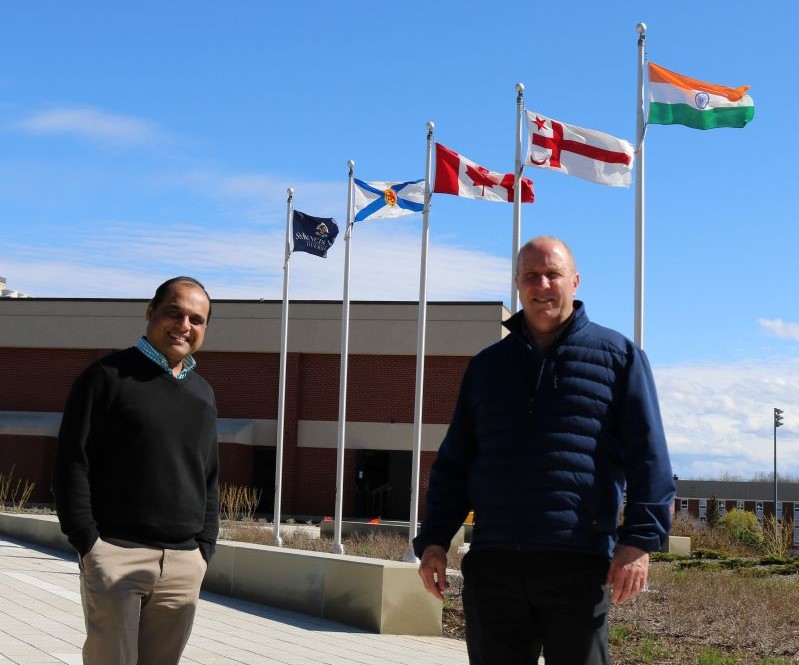St. Francis Xavier University’s Coady Institute is relying on its long-standing partnerships with funders and grassroots organizations to help respond to the deadly Covid-19 situation in India. One of Coady’s longest partnerships is with the Self-Employed Women’s Association (SEWA) in India, a relationship that has existed for 45 years and includes five ongoing initiatives.
As the Covid-19 global pandemic in India deepens, SEWA Director Reema Nanavaty informed Coady how the crisis is affecting its nearly two million members including dozens of cooperatives and more than 10,000 village organizers.
“India is engulfed by the fierce and deadly second wave of Covid-19,” Nanavaty says. “Both urban and rural India are affected. The rural health infrastructure is weak and fragile. Villagers are dying. There are barely any treatment facilities.”
While Coady is unable to provide emergency funding requests, executive director Gord Cunningham and senior program staff member Yogesh Ghore were able to work with Comart Foundation, already a Coady funder for a project with SEWA, to secure an additional $500,000 to help SEWA deal with the immediate emergency as well as support to its members in rebuilding livelihoods.
“This donation unexpectedly touched a deep emotional chord with many people at Coady and Comart,” Roger Martin, Comart Foundation, says. “I think it’s because we were able to respond confidently and quickly to SEWA’s appeal due to the longstanding partnerships and shared values of SEWA, Coady, and Comart.”
The innovative funding model includes $300,000 in immediate Covid-19 relief for such things as equipping the village organizers with PPE to prevent the spread of the virus and to help them ramp up production of masks for their respective villages. The additional $200,000 is for a Livelihoods Recovery and Resilience Fund to help build up long-term resilience through financial and non-financial support to very small farms and other micro-enterprises.
“It is our collective responsibility to protect rural women, children, and citizens from getting infected and dying. In the villages, the members of SEWA are producing and distributing masks, opened community Covid and isolation centres, and have started Covid Helpline with the team of doctors. Villages and villagers need help. Help us in protecting and saving thousands of lives. Let us all be in this together ‘Hum Sab Ek Hai’.”
Nanavaty spoke about the importance of the support and SEWA’s community efforts.
“It is our collective responsibility to protect rural women, children, and citizens from getting infected and dying,” Nanavaty says.
“In the villages, the members of SEWA are producing and distributing masks, opened community Covid and isolation centres, and have started Covid Helpline with the team of doctors. Villages and villagers need help. Help us in protecting and saving thousands of lives. Let us all be in this together ‘Hum Sab Ek Hai’.”
Cunningham says the new funding for SEWA took less than a week to set up and marvels about how a small foundation in Canada like Comart Foundation continues to be innovative about its approach to big issues whether here in Canada or across the world.
“Comart is one of these rare organizations that supports people with passion and their communities both locally and globally,” Cunningham says.
“They were moved by what was happening in India and in SEWA they saw an organization that could quickly combine Comart’s financial resources with the collective agency of thousands of SEWA’s frontline staff and village organizers to immediately start saving lives and livelihoods”
Ghore adds SEWA’s Livelihoods Recovery and Resilience Fund will make a big difference.
“The fund will provide emergency credit and other supports to SEWA’s women entrepreneurs and SEWA affiliated social enterprises,” Ghore says.
“This is a very significant initiative that will have a direct impact on hundreds of thousands of people at the grassroots in India and which in my view is a wonderful example of StFX’s global footprint.”

SEWA members produce masks during the first wave of Covid-19 in 2020.

Yogesh Ghore and Gord Cunningham stand at the StFX University Ceremonial Flag Plaza where the flag of India is raised.
The Coady-SEWA and StFX connection continues to grow stronger. This includes StFX’s John T. Sears Chair in Corporate Social Responsibility a program where three student interns from the Gerald Schwarz School of Business are currently working on three SEWA projects. The student’s work focuses in part on Farmer-led Tools, Dashboard Development and the Future of Farming, a project funded by the Fund for Innovation and Transformation (FIT), as well as a research project on Rethinking Human Capital. Comart Foundation is already providing additional funding to build upon the FIT project by supporting producer-led data driven agriculture efforts.
Other Coady-SEWA initiatives include a Ford Foundation project documenting life stories of SEWA women including how they are responding to the impacts of Covid-19 and the Global Center on Future of Work established by SEWA. The partnership also includes Engage, a five-year initiative co-designed by Coady Institute and five partner organizations in India, Ethiopia, Tanzania, Bangladesh, and Haiti funded by Global Affairs Canada.
StFX acknowledged the four-decade plus partnership between Coady and SEWA in 1999 when it awarded SEWA’s founder Ela Bhatt with an honorary degree. The university recognized Comart Foundation’s generosity during the 2018 St. Francis Xavier University’s President’s Gala.